

Hene
The roaring 1920s and the Crash 1929. The roaring 1920s and the Crash 1929 April 20, 2008 – Comments (11) I'm going to do a two part series about the 1929-1932 bear market and the following great Depression.
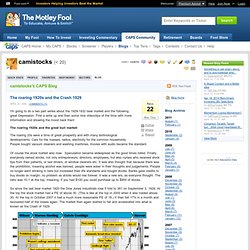
The Great Depression, the gold standard and FDR. The Great Depression, the gold standard and FDR April 26, 2008 – Comments (8) This is the second part, this time on the Great Depression.
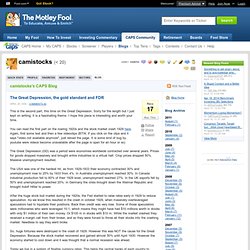
Sorry for the length but I just kept on writing, it is a fascinating theme. Pablo Picasso. Picasso, Henri Matisse and Marcel Duchamp are regarded as the three artists who most defined the revolutionary developments in the plastic arts in the opening decades of the 20th century, responsible for significant developments in painting, sculpture, printmaking and ceramics.[4][5][6][7] Picasso demonstrated extraordinary artistic talent in his early years, painting in a realistic manner through his childhood and adolescence.
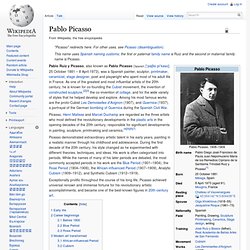
During the first decade of the 20th century, his style changed as he experimented with different theories, techniques, and ideas. His work is often categorised into periods. While the names of many of his later periods are debated, the most commonly accepted periods in his work are the Blue Period (1901–1904), the Rose Period (1904–1906), the African-influenced Period (1907–1909), Analytic Cubism (1909–1912), and Synthetic Cubism (1912–1919). Early life Pablo Picasso and his sister Lola, c.1889 Picasso showed a passion and a skill for drawing from an early age. Fame.
Employment. Funny Stuff. The World Factbook. People from nearly every country share information with CIA, and new individuals contact us daily.
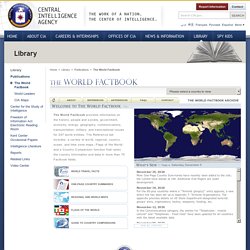
If you have information you think might interest CIA due to our foreign intelligence collection mission, there are many ways to reach us. If you know of an imminent threat to a location inside the U.S., immediately contact your local law enforcement or FBI Field Office. For threats outside the U.S., contact CIA or go to a U.S. Embassy or Consulate and ask for the information to be passed to a U.S. official. Please know, CIA does not engage in law enforcement. In addition to the options below, individuals contact CIA in a variety of creative ways. If you feel it is safe, consider providing these details with your submission:
Freemasonry. Freemasonry is a fraternal organisation that traces its origins to the local fraternities of stonemasons, which from the end of the fourteenth century regulated the qualifications of masons and their interaction with authorities and clients.
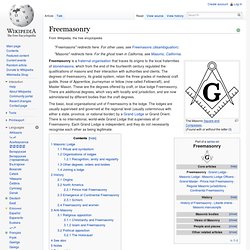
The degrees of freemasonry, its gradal system, retain the three grades of medieval craft guilds, those of Apprentice, journeyman or fellow (now called Fellowcraft), and Master Mason. These are the degrees offered by craft, or blue lodge Freemasonry. The Lost Symbol - Trailer. Secret societies: Band of brothers. Rockefeller family. Rothschild family. A house formerly belonging to the Viennese branch of the family (Schillersdorf Palace).

Schloss Hinterleiten, one of the many palaces built by the Austrian Rothschild dynasty. Donated to charity by the family in 1905. Beatrice de Rothschild's villa on the Côte d'Azur, France The Rothschild family is a family descending from Mayer Amschel Rothschild, a court Jew to the German Landgraves of Hesse-Kassel, in the Free City of Frankfurt, who established his banking business in the 1760s.[1] Unlike most previous court Jews, Rothschild managed to bequeath his wealth, and established an international banking family through his five sons.[2]
Sino-US relationship. Policy. Problems ahead. Keynesian - paradox of thrift. The paradox of thrift is a central component of Keynesian economics, and has formed part of mainstream economics since the late 1940s, though it is criticized on a number of grounds.
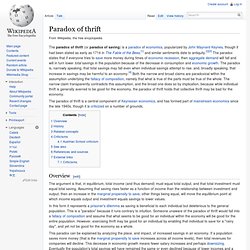
Overview[edit] The argument is that, in equilibrium, total income (and thus demand) must equal total output, and that total investment must equal total saving. Assuming that saving rises faster as a function of income than the relationship between investment and output, then an increase in the marginal propensity to save, other things being equal, will move the equilibrium point at which income equals output and investment equals savings to lower values. In this form it represents a prisoner's dilemma as saving is beneficial to each individual but deleterious to the general population.
This is a "paradox" because it runs contrary to intuition. Keynesian - Liquidity preference. According to Keynes, demand for liquidity is determined by three motives:[1] the transactions motive: people prefer to have liquidity to assure basic transactions, for their income is not constantly available.

The amount of liquidity demanded is determined by the level of income: the higher the income, the more money demanded for carrying out increased spending.the precautionary motive: people prefer to have liquidity in the case of social unexpected problems that need unusual costs. The amount of money demanded for this purpose increases as income increases.speculative motive: people retain liquidity to speculate that bond prices will fall. Western Philosophy Map. If I Am Not For Myself, Who Will Be For Me? Some Moral Dilemmas. The Trolley Problem, not in Grassian.
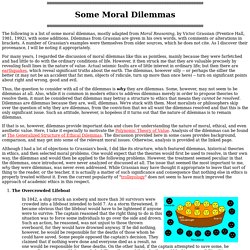
Suggested by Philippa Foot (1920-2010), daughter of Esther, the daughter of President Grover Cleveland, but of British birth because of her father, William Sidney Bence Bosanquet. A trolley is running out of control down a track. In its path are five people who have been tied to the track by a mad philosopher. Fortunately, you could flip a switch, which will lead the trolley down a different track to safety. Unfortunately, there is a single person tied to that track. This is a classic "right vs. good" dilemma. The Costly Underwater Tunnel Compare: 112 men were killed during the construction of Hoover Dam on the Nevada-Arizona border (the "official" number was 98, but others had died from causes more difficult to identify -- or easier to ignore -- like by carbon monoxide poisoning): The first to die was a surveyor, J.G.
The Manifesto of the Communist Party. Socialism (Marxism) Production for use. This principle is broad and can refer to an array of different configurations that vary based on the underlying theory of economics employed.
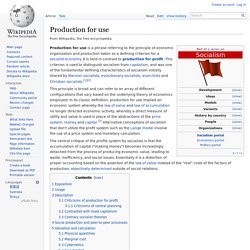
In its classic definition, production for use implied an economic system whereby the law of value and law of accumulation no longer directed economic activity, whereby a direct measure of utility and value is used in place of the abstractions of the price system, money and capital.[3] Alternative conceptions of socialism that don't utilize the profit system such as the Lange model involve the use of a price system and monetary calculation. The central critique of the profits system by socialists is that the accumulation of capital ("making money") becomes increasingly detached from the process of producing economic value, leading to waste, inefficiency, and social issues.
Allegory of the Cave - Plato. Plato realizes that the general run of humankind can think, and speak, etc., without (so far as they acknowledge) any awareness of his realm of Forms. The allegory of the cave is supposed to explain this. Heterodox economics: Marginal revolutionaries. Austrian School. The Austrian School is a school of economic thought that is based on the analysis of the purposeful actions of individuals (see methodological individualism).[1][2][3][4] It originated in late-19th and early-20th century Vienna with the work of Carl Menger, Eugen von Böhm-Bawerk, Friedrich von Wieser, and others.[5] Current-day economists working in this tradition are located in many different countries, but their work is referred to as Austrian economics.
Among the theoretical contributions of the early years of the Austrian School are the subjective theory of value, marginalism in price theory, and the formulation of the economic calculation problem, each of which has become an accepted part of mainstream economics.[6] Many economists are critical of the current-day Austrian School and consider its rejection of econometrics, and aggregate macroeconomic analysis to be outside of mainstream economic theory, or "heterodox. Methodology[edit] Economist Paul A. Luca Pacioli - Father of Accounting. Fra Luca Bartolomeo de Pacioli (sometimes Paccioli or Paciolo; 1445–1517) was an Italian mathematician, Franciscan friar, collaborator with Leonardo da Vinci, and seminal contributor to the field now known as accounting, and is also referred as Father of Bookkeeping(in fact,he is the Father of double entry system of Book-keeping).[2] He was also called Luca di Borgo after his birthplace, Borgo Sansepolcro, Tuscany.
Life[edit] Luca Pacioli was born in 1445 in Sansepolcro (Tuscany) where he received an abbaco education. This was education in the vernacular (i.e. the local tongue) rather than Latin and focused on the knowledge required of merchants. He moved to Venice around 1464, where he continued his own education while working as a tutor to the three sons of a merchant. It was during this period that he wrote his first book, a treatise on arithmetic for the boys he was tutoring. Leonardo da Vinci. Law of averages. The law of averages is a layman's term used to express a belief that outcomes of a random event will "even out" within a small sample.
As invoked in everyday life, the "law" usually reflects bad statistics or wishful thinking rather than any mathematical principle. While there is a real theorem that a random variable will reflect its underlying probability over a very large sample, the law of averages typically assumes that unnatural short-term "balance" must occur.[1] Typical applications of the law also generally assume no bias in the underlying probability distribution, which is frequently at odds with the empirical evidence.
[citation needed] Examples[edit] Belief that an event is "due" to happen: For example, "The roulette wheel has landed on red in three consecutive spins. Libertarianism: a nice idea, but doomed. Find More Stories Libertarianism: a nice idea, but doomed Darryl Adams. Russ Roberts: Why Friedrich Hayek is Making a Comeback. By Russ Roberts This article originally appeared in the Wall Street Journal on June 28, 2010. He was born in the 19th century, wrote his most influential book more than 65 years ago, and he's not quite as well known or beloved as the sexy Mexican actress who shares his last name. What’s Wrong with Keynes.
The Critical Flaw in Keynes's System. As part of my Mises Academy class Keynes, Krugman, and the Crisis, I have reread large portions of The General Theory. In his masterpiece, Keynes erects an impressive framework on one crucial assumption: left to its own devices, the free market can get stuck in an equilibrium with very high unemployment.
Although Keynes's whole edifice and critique of the "classical economists" rests on this belief, he devotes surprisingly little time to supporting it. John Forbes Nash, Jr. John Forbes Nash, Jr. (born June 13, 1928) is an American mathematician whose works in game theory, differential geometry, and partial differential equations have provided insight into the factors that govern chance and events inside complex systems in daily life. Why I agree with (some of) Friedrich Hayek. A Beautiful Mind (2001. What is Game Theory? Translations: Czech courtesy of Autip. Macedonian courtesy of Zoran Mitreski. Russian courtesy of Oleg Meister. German courtesy of Alexy Gnatuk. Romanian courtesy of Alexandra Seremina and Azoft.
Arabic numerals. Fear the Boom and Bust. 20 Best Websites To Download Free EBooks. Download e-books for free.
Gadgets. Vincent van Gogh.